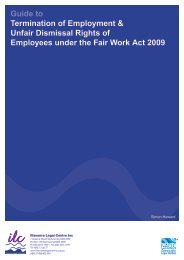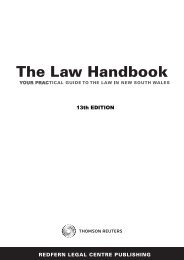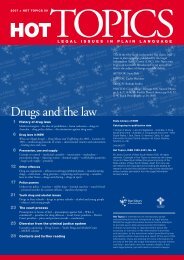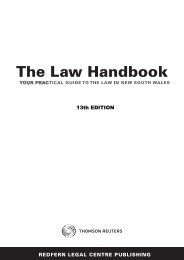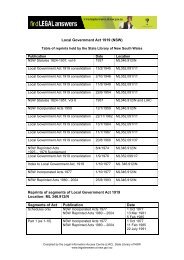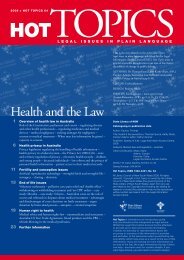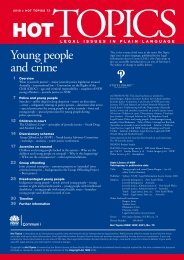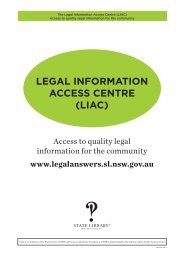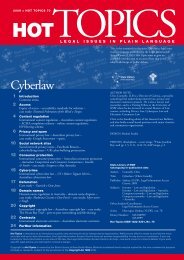Consumers | The law handbook - Legal Information Access Centre
Consumers | The law handbook - Legal Information Access Centre
Consumers | The law handbook - Legal Information Access Centre
- No tags were found...
Create successful ePaper yourself
Turn your PDF publications into a flip-book with our unique Google optimized e-Paper software.
350 <strong>The</strong> Law HandbookProtections in relation to trader conduct[11.30] Unconscionableconduct<strong>The</strong> former legislative provisions againstunconscionable conduct are now embodiedin the ACL, Pt 2-2. <strong>The</strong> Law itself containsno definition of “unconscionable conduct”.However, in considering whether conduct isunconscionable, the court may consider aseries of factors (s 21) not limited to butincluding:(a) the relative strengths of the bargainingpositions of the supplier and the consumer;and(b) whether, as a result of conduct engagedin by the person, the consumer wasrequired to comply with conditions thatwere not reasonably necessary for theprotection of the legitimate interests ofthe supplier; and(c) whether the consumer was able to understandany documents relating to thesupply or possible supply of the goodsor services; and(d) whether any undue influence or pressurewas exerted on, or any unfairtactics were used against, the consumeror a person acting on behalf of theconsumer by the supplier or a personacting on behalf of the supplier inrelation to the supply or possible supplyof the goods or services; and(e) the amount for which, and the circumstancesunder which, the consumer couldhave acquired identical or equivalentgoods or services from a person otherthan the supplier.[11.40] Misleading anddeceptive conduct<strong>The</strong> former provisions are now contained ins 18 of the ACL. A person must not in thefield of trade or commerce engage in conductwhich is misleading or deceptive, orlikely to mislead or deceive. <strong>The</strong> prohibitionis in very wide terms and covers advertising,behaviour in the course of negotiating acontract, and behaviour afterwards. <strong>The</strong>provision is concerned with conduct, notcontract. It is unnecessary to prove that theconduct was fraudulent or even negligent. Itis necessary to prove that the conduct wasmisleading or deceptive, and that the complainantrelied upon it, or was induced by itand thereby suffered loss.[11.50] Unfair terms incontractsPart 2-3 of the ACL covers unfair terms incontracts. <strong>The</strong> provisions deal only withconsumer contracts, ie a contract for thesupply of goods or services or the sale orgrant of an interest in land to an individualwhose acquisition of the goods, services orinterest is wholly or predominantly forpersonal, domestic or household use orconsumption.See also the Contracts Review Act whichdeals with contracts or terms of contractswhich are unjust in light of the circumstancespertaining to the contract at the timethe contract was made.If a term of a consumer contract is foundto be unfair under Pt 2-3 of the ACL theterm may be void. <strong>The</strong> balance of thecontract will remain on foot if it is capable ofoperating without the unfair term. In orderfor a term of a contract to be void, it isnecessary both that the term be unfair andthat the contract be a standard form contract.Terms which define the main subject matterof the contract, or set the upfront pricepayable, or which are required or expresslypermitted by <strong>law</strong>, are not covered (s 26).Section 24 provides that a term is unfair if:(a) it would cause a significant imbalance inthe parties’ rights and obligations arisingunder the contract; and





